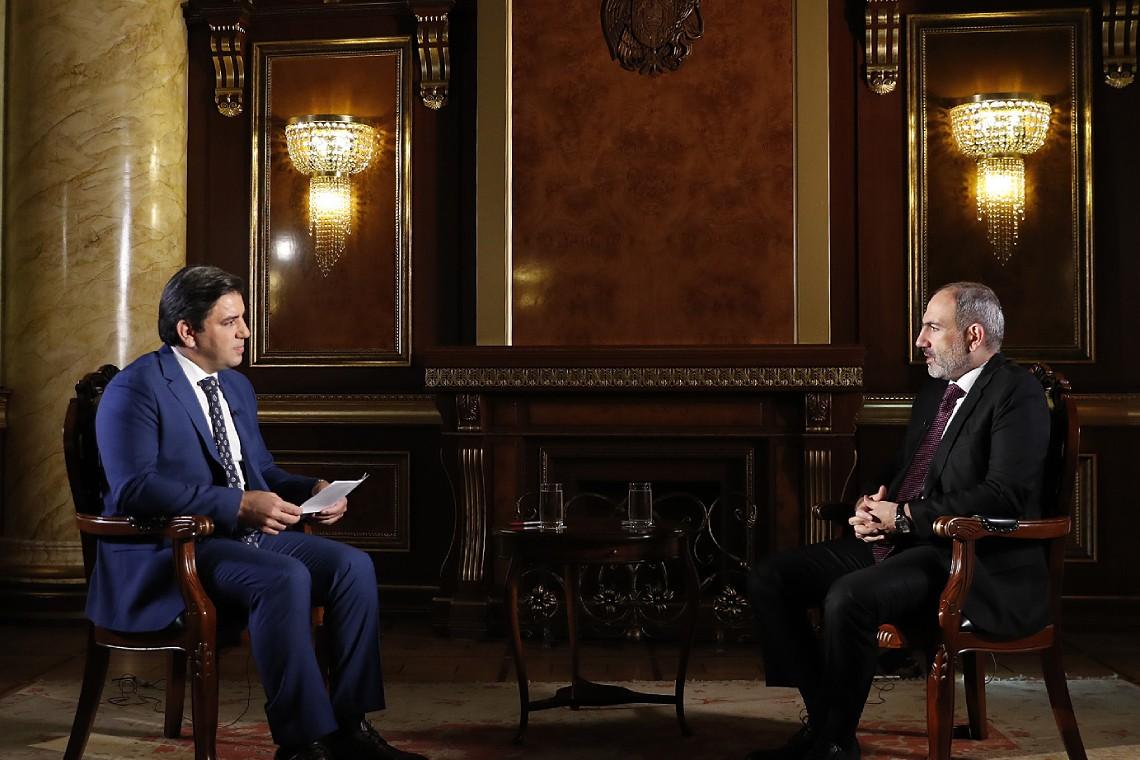
Pashinyan to Al Jazeera: Azerbaijani Public Will Never Get News of a “Final Victory”
Armenian Prime Minister Nikol Pashinyan gave an interview to the Al Jazeera TV channel. Below is the English transcript of the interview as provided by Pashinyan’s office.
Good morning. Armenian Prime Minister Nikol Pashinyan is our guest at today’s special edition. Mr. Prime Minister, welcome and thank you for talking to Al Jazeera.
Thank you.
Mr. Prime Minister, could you please brief us on the official relationship between Armenia and Nagorno-Karabakh.
First, I would like to state that Armenians have lived in Nagorno-Karabakh for several millennia. Armenians constituted over 80% of the population in the Nagorno-Karabakh Autonomous Region. I would also like to state that there is a huge Armenian cultural heritage in Nagorno-Karabakh: churches and other monuments, some dating back to the 5th century. The first Armenian school was established in Nagorno-Karabakh.
In 1988, the Armenians of Nagorno-Karabakh tried to reinstate their rights, as part of a democratization process going on in the Soviet Union. When the Soviet Union was being formed, Nagorno-Karabakh, with its 80% of Armenian population, was handed over to Soviet Azerbaijan and not to Soviet Armenia because of Stalin’s arbitrary decision.
When democratization began in the Soviet Union, the Armenians of Nagorno-Karabakh tried to restore their rights through political means, to reunite with the Republic of Armenia, to which the Soviet Union and Azerbaijan responded with brutal violence against the peaceful population. I am referring to the following, our relationship is with the people, the people who have lived, are now living and will live in Karabakh.
How can we describe Nagorno-Karabakh, for example, where do I go when traveling from Armenia to Karabakh?
Nagorno-Karabakh declared its independence later, we call it the Republic of Nagorno-Karabakh or Artsakh, where there is an elected president, there is a parliament, and there are also state agencies. It is not considered the territory of the Republic of Armenia. The Nagorno-Karabakh Republic is a proclaimed state, which, unfortunately, has not yet received international recognition.
Mr. Prime Minister, you talked about the historical aspect. The Azerbaijanis submitted documented evidence that those lands belong to them. Talking about international law, what could you say about the UN Security Council resolution?
I would like to draw your attention to the following fact: if we interpret international law the same way as Azerbaijan does, we should be able to say that Azerbaijan is part of the Soviet Union. But there is no such independent state anymore. If you can say that the Soviet Union does not exist, therefore, Azerbaijan cannot be part of the Soviet Union.
Similarly, Soviet Azerbaijan does not exist anymore for the Nagorno-Karabakh Autonomous Region, which used to be part of the now defunct Soviet Azerbaijan. As for the UN Security Council resolutions, they were adopted in a specific situation; they described a specific situation relating to the conflict between the Armenian self-defense forces of Nagorno-Karabakh, the armed forces of Azerbaijan, and its ensuing outcome. What is described in the Security Council resolution has an important context. I have already said that Azerbaijan responded to the peaceful political struggle with force, as it does today, by bombing and shelling peaceful settlements.
To protect those peaceful settlements from rocket fire, the Nagorno-Karabakh self-defense forces were obliged to establish a security zone.
When hostilities broke out, you said that Armenia might unilaterally recognize Nagorno-Karabakh’s independence. What can this change now?
That issue has been and is on our agenda, but the main concern for us is not so much that the Republic of Armenia recognizes the independence of Nagorno-Karabakh, because the Republic of Armenia can always do that. It is especially important that other members of the international community recognized it. And today we think that this issue is more urgent, considering the current situation, considering the humanitarian catastrophe in which Nagorno-Karabakh finds itself; considering the indisputable fact that Nagorno-Karabakh within Azerbaijan means Nagorno-Karabakh without Armenians. We believe that in this case, the formula of “remedial secession” should be applied, and the international community should recognize the independence of Nagorno-Karabakh.
You talked about ethnic cleansing. Azeris accuse you of changing the identity of Karabakh, destroying cemeteries and mosques, changing its name to Artsakh.
No graves were destroyed. A mosque in Shushi was recently renovated in Nagorno-Karabakh with modern technologies. Mosques are being paid special attention by the Nagorno-Karabakh authorities. And if you go to Shushi, you will see a magnificent, restored mosque, unless the Azerbaijanis shelled it already. Why do I say that? Because the Ghazanchetsots Church in Shushi, the Armenian Church, was precision-targeted and is now in a dilapidated condition.
I have already visited Shushi and filmed the mosque. Azerbaijan accuses you of rebuilding the mosque and changing its identity, not religiously, but historically. According to Azerbaijan, it had its own historical identity.
I know that the mosque was restored under the supervision of Shiite clerics and specialists. And it could not be otherwise. In other words, it was restored under the supervision of Muslim clerics, theologians, specialists, following their plans and advice.
See full interview HERE
 Videos
Videos Photos
Photos
Comments (2)
Write a comment